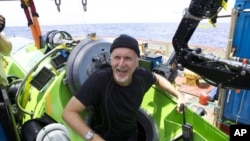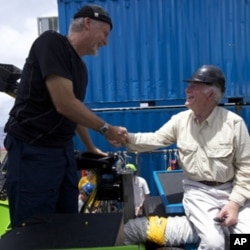Filmmaker James Cameron has gone where only two men have gone before him, down 11 kilometers to the deepest point on Earth, in the Pacific Ocean off the coast of Guam.
On Monday, March 26 local time, the director of "Titanic" and "Avatar" journeyed to the bottom of the Mariana Trench, an ocean-floor valley 50 times larger than the Grand Canyon and deeper than Mount Everest is high.
What he could see, illuminated by his submersible's floodlights, was a flat, featureless landscape.
“The impression to me was that it was a very lunar, a very desolate place, very isolated," he said in a telephone news conference after his successful dive. "My feeling was that it was very isolated from all of humanity. I felt like literally in the space of one day I had gone to another planet and come back.”
Cameron made the journey in a unique, lime-green, torpedo-shaped submersible, a one-person craft he helped design with a team of engineers over the past eight years.
Unlike most submersibles, the tiny sub, called Deepsea Challenger, is oriented vertically. It uses lighter materials, like super-strong structural foam, to improve buoyancy and withstand the enormous deep-sea pressures.
The craft is also equipped with 3D cameras and a giant LED light tower, as well as a robotic claw, a sediment collector and a “slurp gun.”
While he was able to take photographic images, the vehicle’s hydraulic system reportedly malfunctioned, leaving the filmmaker unable to collect as many samples as he'd planned.
He told reporters the 7-hour journey proved the vehicle works and can be deployed on future missions to unlock the many mysteries about life at the ocean bottom.
"We know very little about the species that live down there," Cameron said before the dive. "We know little about the distribution of the biological communities. We don't know how these animals have adapted to this unbelievable pressure that exists down there."
Cameron's mission owes much to a pioneering dive made more than a half-century ago.
A two-man crew - Swiss oceanographer Jacques Piccard and then-U.S. Navy Lieutenant Don Walsh - took a bathyscaphe, called the Trieste, to the bottom of the Mariana Trench.
For more than 50 years, that record in ocean exploration had not been broken, until now.
Piccard died in 2008, at the age of 86. However, Walsh, now a retired Navy captain, was on board the ship that launched Deepsea Challenger into the Mariana Trench on Monday.
Cameron said he and Walsh share a unique bond, "a club of two," that will continue to expand the frontier of human exploration.





